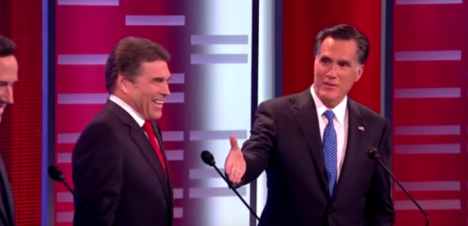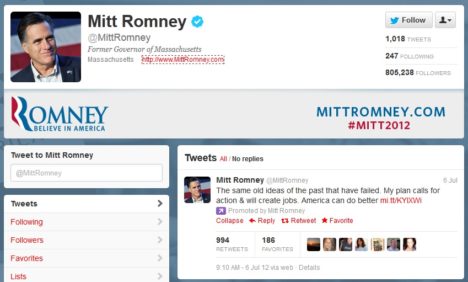How To Win An Election With Marketing
With an eye to the upcoming Federal election, guest columnist Alex Connell revisits the 2012 US Presidential election to examine five key marketing factors that swayed the outcome.
 As local marketers begin to plan multi-million dollar election campaigns for their respective parties, what does it actually take to win an election with marketing?
As local marketers begin to plan multi-million dollar election campaigns for their respective parties, what does it actually take to win an election with marketing?
By analysing the most successfully marketed election campaign of all time, Obama’s 2012 win over Mitt Romney, here are five things to consider during the upcoming Australian election campaigns:
- The Power of the Slogan
Obama’s slogan ‘Change’ was much stronger than Romney’s ‘Believe in America’. Change, when relating to politics, is a word that infers a positive outlook; things will be done, our problems will be solved, all our issues will go away. What does ‘Believe in America’ imply? That people don’t believe in America? Why don’t you believe in America? ‘Belief’ isn’t going to fix America, but ‘change’ will.
- Find your story and sing it
Every successful brand has its own intriguing story, it’s even better if that story can invoke some admiration or empathy. Obama was born to a middle class Kenyan father and English mother, was involved in gangs and drug use during his teens, reformed to attend and graduate from Harvard, then went on to become the first African American president in United States’ history.
What was Romney’s story? A multi-millionaire Mormon businessman from Salt Lake City, who is friends with other mega-rich entrepreneurs such as Donald Trump. Romney’s team made no substantial attempt to change this; to provide Romney with another dimension for potential voters. They definitely weren’t aided by Romney stating he liked firing people or the “$10,000 bet” brain-melt. His money-orientated approach of reduced taxes to the wealthy, only further cemented him as the mega-rich Mormon in the minds of voters.
- Establish a point of difference
Romney didn’t successfully establish a point of difference, instead spending most of the campaign attacking Obama for things he hasn’t done. In 2012 America had more than 20 million unemployed and debt in excess of 70% of the GDP, if Romney had established and executed his point of difference (business experience), the election should have been his. Obama has never worked in the private sector, whereas Romney has a vast amount of business experience. Brands don’t beat the competition by trying to denigrate their opposition, they do it by offering a positive concept and exploiting the fact that the opposition lacks this.
- Leverage Social Channels
Finally, Obama’s team executed a sophisticated social media plan, whereas Romney’s looked like it may have been controlled by the 65-year-old businessman himself. Romney and his advisers stated that Obama’s campaign was wrapped up in petty catch-phrases and internet fads at a time when voters were preoccupied with much larger issues. At an October 19, 2012, rally in Daytona Beach, Florida, Romney accused Obama of running an “incredible shrinking campaign” based on “silly word games”, saying he had no agenda for the future. Oh, how wrong Romney was.
Obama’s strategic social media campaign did a number of things for his campaign: it gave a voice/interaction to voters, one which spoke in a quirky social media tongue (“This seat’s taken”); It kept the campaign real-time and immediate; embraced celebrity endorsers – Beyonce, Fergie and Madonna all actively pushed the Obama brand on social media – offering an attractive dimension to the brand; and it reinforced the campaign’s overall message – using Twitter and Facebook to constantly publish quotes, policies and statistics in Obama’s favour.
- Stick to the plan
In any field it’s never easy for the incoming challenger to dismantle the established leader, but Romney had a great chance. Romney’s campaign ignored several vital marketing laws: the law of perception (how you want to be received by an audience), the law of focus (staying true to a small number of strong principles, rather than trying to do everything at once); the law of the opposite (positioning yourself as different to the leader); and the law of sacrifice (giving up something in order to be competitive elsewhere).
The infinite variety of cross-tabulations and subsets of data, provided by research, frequently lead political consultants and marketers to overcomplicate the message of their campaign. However, it is programs that recognise the power of simplicity and consistency that most often succeed.
Alex Connell is a digital planner on the Telstra account at OMD Sydney






have u ever worked in political advertising??
User ID not verified.
Alex, great words. I expect your next article to be about how you went from a Planner to a President.
User ID not verified.
Loved it! Very insightful 🙂
User ID not verified.
Agreed Isobell!!!
User ID not verified.
If only more planners were this insightful and articulate. Great read.
User ID not verified.
Ripper article Alex, Steel City is proud of you. X
User ID not verified.
One of the defining factors of the marketing tactics used by US political campaigns is that the US does not have compulsory voting. To put into context how prevalent not voting is in the US, for all of the coverage Donald Trump is getting, only 4.7% of eligible voters have voted for him across all of the primaries and caucuses through to 3 May 2016 (source: Vox).
This playing field brings to the forefront additional “Get Out The Vote” tactics that sound alien in the context of Australian elections and/or commercial brand management:
1) Since US election winners are determined under a first-past-the-post system, political campaigns often aim to move relative support in its direction by “going negative” with mass reach campaigns and earned media coverage that feature messages that were crafted to intentionally de-motivate more of the opposing candidate’s supporters than it de-motivates the preferred candidate’s supporters. In the view that vote tallies are a scoreboard, (Our side: +1,Their side: +0) and (Our side: -1, Their side: -2) serve the same purpose (source: long ago coursework).
2) US political campaign operations often identify and model which individual voters the campaign (candidate or issue) wants to encourage to show up to voting booths on election day. From doing this, US political campaigns then can activate these segments through not only email and SMS but also prioritise activation through solutions that are more costly to scale: regular mail, phone call, door knock, letter drop, lawn sign, even so far as shuttle buses on election day (source: personal low level experience in US GOTV operations from when the blue team was playing catch up to Voter Vault in the Bush era).
3) Conversely campaigns suppress paid voter outreach activity to known and likely detractors in the hopes this makes them marginally more likely to refrain from voting if unprompted to show up (source: logical extension of above). This is surprisingly similar logic to dialling down DSP spend on segments that aren’t performing.
4) Considering the national remit of the political parties and special interest groups that fund campaigns and recent advances in marketing automation, the 2016 elections will feature an unprecedented swiftness in how trailing candidates in formerly close races experience national organisations re-mobilising planned resources away from them and towards electorates that are more competitive. Now that I think about it, real time weather data projection providers could do very well this election (source: conjecture).
Tangentially related: Super PACs get absolutely fleeced by publishers. They routinely pay premiums over +100% on top of rate cards that candidates’ campaigns pay.
User ID not verified.
@meh (?) emoticon. Insane reading. At the risk of oversimplification, and assuming Trump and Clinton win their respective party nominations, would you say the campaign is going to be decided by the ‘Get out the vote because we can’t let this person be President’ component? And if so, would Clinton provide a less divisive figure than Trump in relative terms. All moot of course, but interested in your thoughts.
User ID not verified.